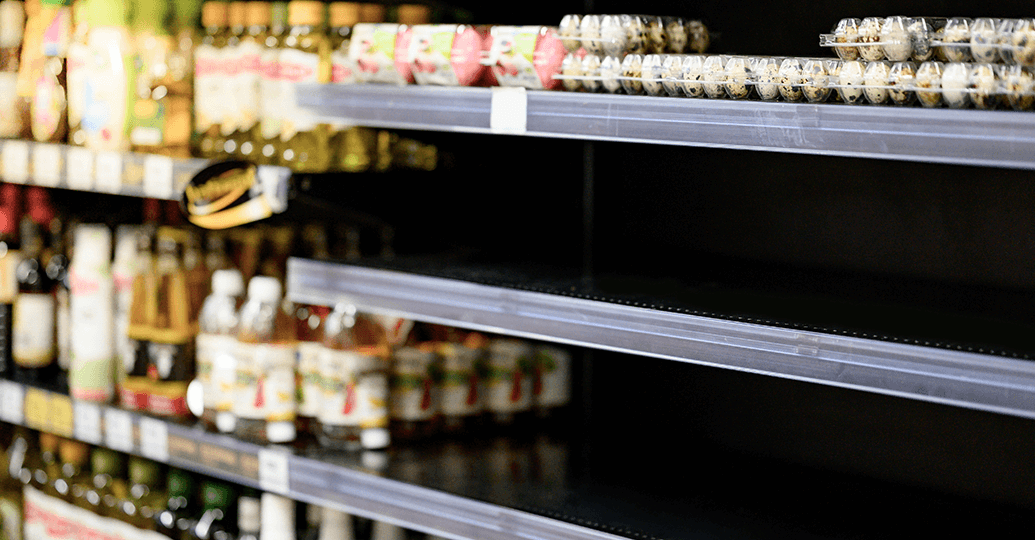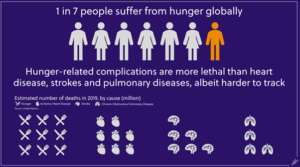
Food security is the name given to a set of actions and programs that aim to guarantee the entire population access to adequate food, including providing a

Food security is the name given to a set of actions and programs that aim to guarantee the entire population access to adequate food, including providing access to water, the availability and distribution of food, adequate consumption according to nutritional need, and support for food production and transport processes.
Combating hunger has always been on the agendas of national and world governmental bodies, with more challenges found in developing countries. However, starting with the General Assembly of the United Nations (UN), which was held in New York in September 2015, the World Organization of the UN established “17 Sustainable Development Goals” (SDGs).
One of the missions of the so-called “2030 Agenda” is to put an end to all forms of hunger in the world by that same year, giving the project its name. But it was only after the establishment of the objectives that several global conflicts erupted, bringing catastrophic consequences. Is it possible to achieve the goal of bringing food security to the entire population of the world?
A vital point worth noting is that the issue of world hunger is not linked only to securing enough food, but also to its distribution. This is because production is concentrated in certain regions, while consumption takes place across the globe.
The term food security was coined during the First World War. In other words, it clarifies the direct relationship between the problem of hunger and the worst global tragedies.
In recent years, the world has faced a Covid-19 pandemic that has already led to the death of more than 6 million people, and resulted in various kinds of invaluable damage. More recently, it was the outbreak of war between Russia and Ukraine that has shaken both countries directly, but many others indirectly. In the latter, special attention has been focused on the supply of grains—the basis of human nutrition.
From 2015 to 2020, world hunger numbers were relatively unchanged. But in the year the pandemic began, they skyrocketed. In the 2022 edition of “The State of Food and Nutrition Security in the World” report developed by the UN, it states that in 2021, 828 million people went hungry—an increase of 46 million people compared to 2020, and 150 million compared to 2019.

In a disastrous situation, such as the coronavirus pandemic, the focus of world leaders is naturally to fight and prevent disease. However, several other factors are affected in parallel.
Throughout the agribusiness chain, there have been difficulties in relation to the production of inputs, lack of raw materials, difficulties in storage and transport, resulting in distribution problems, and inflation in food prices that reached the final consumer’s table.
With the war in Ukraine, Brazil has felt the effects of the low availability of fertilizers, 85% of which are imported. But there are other indirect impacts, such as the status of corn and wheat availability, as Ukraine is the fourth and fifth largest exporter of these commodities in the world, respectively.
The price of these commodities is set internationally due to supply and demand. When a large producer/exporter like Ukraine has a deficit in its production or faces restrictions making this supply available (as has happened during the war), the price goes up. If the price of corn rises, for example, it then impacts the prices of chicken, pork, milk, and so on, causing a domino effect.
Therefore, when major conflicts destabilize the world, and hence increase food insecurity, it means that they directly affect one or several parts of the agribusiness chain. This is because the losses of those who produce end up being reflected in the difficulties of accessing food, whether for economic, financial, or operational reasons.
Brazil is currently one of the largest food producers in the world. But even so, it’s estimated that more than 61 million Brazilians face a situation of food insecurity.
Of course, it’s not just the amount of food produced that contributes to establishing food security, but also its distribution, storage, and surely, affordable prices. Given all the recent events, inflation has reached high levels in most economies, making it impossible for a large part of the population to have adequate access to food.
Some specialists believe that it’s necessary to have two consecutive years of good harvests, not only in Brazil, but in the world, to bring inflation under control again. In Brazil is common to see food costs rising year after year. Yet in more developed countries, it’s a shock to see prices rise so much.
In the northern hemisphere, the harvesting of grain crops is practically completed, but in most cases, the results have been lower than those of past harvests. However, Brazil is preparing to reap good results this year, and there’s even the expectation of a possible record soybean harvest. (Link to post)
However, there’s the whole macroeconomic context in the background that makes the scenario still a challenge (an increase in interest rates which discourage investments, for example). On top of this, the issue of food security touches on a very important point: the population’s purchasing power—a question of income.
Bearing in mind that the price of commodities is formed by international supply and demand, the producer and the entire agribusiness chain are exposed to market risks. Yet there are ways to manage them and prevent losses.
Having a hedging strategy can be the key to protect your business from the instability in financial markets, both by avoiding unpleasant surprises in your financial planning, and by taking advantage of good opportunities to lock in your margins. But it’s not enough to just decide to use this form of protection without intensive study and prior knowledge.
The best option to enter this universe is to rely on a partner who has vast understanding of the agribusiness market, and at the same time, the financial markets. Only from a broad view of such a complex context and global markets is it possible to make the best decisions.
hEDGEpoint combines the knowledge of specialists in the agribusiness market with risk management solutions through technology, and customized consulting, to always offer you the best experience in derivatives operations.
We are globally present, and always ready to serve you—anytime, anywhere. Get in touch with a consultant now to find out more about how to use these instruments to favor your business.
Talk to a hEDGEpoint specialist.

Rua Funchal, 418, 18º andar - Vila Olímpia São Paulo, SP, Brasil
Contato
(00) 99999-8888 example@mail.com
Section
Home
O que Fazemos
Mercado
Quem Somos
HUB
Blog
Esta página foi preparada pela Hedgepoint Schweiz AG e suas afiliadas (“Hedgepoint”) exclusivamente para fins informativos e instrutivos, sem o objetivo de estabelecer obrigações ou compromissos com terceiros, nem de promover uma oferta ou solicitação de oferta de venda ou compra de quaisquer valores mobiliários, commodity interests ou produtos de investimento.
A Hedgepoint e suas associadas renunciam expressamente a qualquer uso das informações contidas neste documento que direta ou indiretamente resulte em danos ou prejuízos de qualquer natureza. As informações são obtidas de fontes que acreditamos serem confiáveis, mas não garantimos a atualidade ou precisão dessas informações.
O trading de commodity interests, como futuros, opções e swaps, envolve um risco substancial de perda e pode não ser adequado para todos os investidores. Você deve considerar cuidadosamente se esse tipo de negociação é adequado para você, levando em conta sua situação financeira. O desempenho passado não é necessariamente indicativo de resultados futuros. Os clientes devem confiar em seu próprio julgamento independente e/ou consultores antes de realizar qualquer transação.
A Hedgepoint não fornece consultoria jurídica, tributária ou contábil, sendo de sua responsabilidade buscar essas orientações separadamente.
A Hedgepoint Schweiz AG está organizada, constituída e existente sob as leis da Suíça, é afiliada à ARIF, a Associação Romande des Intermédiaires Financiers, que é uma Organização de Autorregulação autorizada pela FINMA. A Hedgepoint Commodities LLC está organizada, constituída e existente sob as leis dos Estados Unidos, sendo autorizada e regulada pela Commodity Futures Trading Commission (CFTC) e é membro da National Futures Association (NFA), atuando como Introducing Broker e Commodity Trading Advisor. A Hedgepoint Global Markets Limited é regulada pela Dubai Financial Services Authority. O conteúdo é direcionado a Clientes Profissionais e não a Clientes de Varejo. A Hedgepoint Global Markets PTE. Ltd está organizada, constituída e existente sob as leis de Singapura, isenta de obter uma licença de serviços financeiros conforme o Segundo Anexo do Securities and Futures (Licensing and Conduct of Business) Act, pela Monetary Authority of Singapore (MAS). A Hedgepoint Global Markets DTVM Ltda. é autorizada e regulada no Brasil pelo Banco Central do Brasil (BCB) e pela Comissão de Valores Mobiliários (CVM). A Hedgepoint Serviços Ltda. está organizada, constituída e existente sob as leis do Brasil. A Hedgepoint Global Markets S.A. está organizada, constituída e existente sob as leis do Uruguai.
Em caso de dúvidas não resolvidas no primeiro contato com o atendimento ao cliente (client.services@hedgepointglobal.com), entre em contato com o canal de ouvidoria interna (ombudsman@hedgepointglobal.com – global ou ouvidoria@hedgepointglobal.com – apenas Brasil) ou ligue para 0800-8788408 (apenas Brasil).
Integridade, ética e transparência são valores que guiam nossa cultura. Para fortalecer ainda mais nossas práticas, a Hedgepoint possui um canal de denúncias para colaboradores e terceiros via e-mail ethicline@hedgepointglobal.com ou pelo formulário Ethic Line – Hedgepoint Global Markets.
Nota de segurança: Todos os contatos com clientes e parceiros são realizados exclusivamente por meio do nosso domínio @hedgepointglobal.com. Não aceite informações, boletos, extratos ou solicitações de outros domínios e preste atenção especial a variações em letras ou grafias, pois podem indicar uma situação fraudulenta.
“Hedgepoint” e o logotipo “Hedgepoint” são marcas de uso exclusivo da Hedgepoint e/ou de suas afiliadas. O uso ou reprodução é proibido, a menos que expressamente autorizado pela HedgePoint.
Além disso, o uso de outras marcas neste documento foi autorizado apenas para fins de identificação. Isso, portanto, não implica quaisquer direitos da HedgePoint sobre essas marcas ou implica endosso, associação ou aprovação pelos proprietários dessas marcas com a Hedgepoint ou suas afiliadas.
aA Hedgepoint Global Markets é correspondente cambial do Ebury Banco de Câmbio, de acordo com a resolução CMN Nº 4.935, DE 29 DE JULHO DE 2021, Artigo 14 do Banco Central do Brasil (BACEN).
Para mais informações sobre nosso parceiro, serviços disponíveis, atendimento e ouvidoria, acesse o link a seguir: https://br.ebury.com/